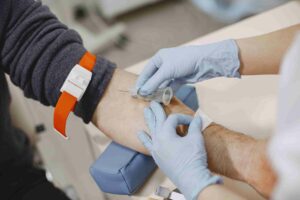As women embark on the transformative journey of menopause, understanding the changes occurring in their bodies becomes crucial for maintaining optimal health and well-being. Menopause is a natural biological process signaling the end of the reproductive years, accompanied by a range of symptoms that vary from woman to woman. In this blog, we will explore the diagnostic tests for menopause available to help women and their healthcare providers navigate the transition with knowledge and empowerment.
Contents
When to Consider Diagnostic Testing?
 Diagnostic tests can provide valuable insights into hormonal changes and other factors related to menopause. Here are some key considerations for determining when to consider diagnostic testing:
Diagnostic tests can provide valuable insights into hormonal changes and other factors related to menopause. Here are some key considerations for determining when to consider diagnostic testing:
- Persisting Menopausal Symptoms
If you are consistently experiencing symptoms commonly associated with menopause. Such as hot flashes, night sweats, mood swings, and changes in menstrual patterns, it may be a good time to consider diagnostic testing.
- Age and Reproductive Stage
Women typically enter menopause in their late 40s to early 50s. If you are in this age range and have noticed changes in your menstrual cycle or other menopausal symptoms, it’s a suitable time to discuss diagnostic testing with your healthcare provider.
- Irregular Menstrual Cycles
Irregular periods can be indicative of hormonal fluctuations associated with menopause. If you are experiencing irregularities in your menstrual cycle, diagnostic testing may provide valuable information.
- Family History
A family history of early menopause or certain reproductive health issues may influence the timing of diagnostic testing. If your mother or sisters experienced early menopause, you may want to discuss testing options with your healthcare provider.
- Concerns About Bone Health
Menopause is associated with a decline in estrogen levels, which can impact bone density. If you have concerns about osteoporosis or fractures, your healthcare provider may recommend bone density testing as part of the diagnostic process.
- Fertility Concerns
If you have concerns about fertility and family planning, diagnostic testing can provide information about your reproductive status and the likelihood of conception.
Remember, every woman’s experience with menopause is unique. Thus there is no one-size-fits-all approach. Your healthcare provider can help tailor diagnostic testing based on your individual needs and health goals.
What Are Some Diagnostic Tests For Menopause?
Several diagnostic tests for menopause can help assess and confirm the onset, as well as provide valuable information about hormonal changes and potential health risks. Here are some common diagnostic tests for menopause:
Follicle-stimulating hormone (FSH)
FSH levels tend to rise as a woman approaches menopause. High levels of FSH in the blood may indicate a decline in ovarian function. A blood test measuring FSH levels is often used to help diagnose menopause.
Luteinizing Hormone (LH)
Similar to FSH, LH levels can increase during menopause. Elevated levels of LH, in conjunction with other symptoms, can contribute to the diagnosis of menopause. A blood test is used to measure LH levels.
Estradiol Test
Estradiol is a form of estrogen produced by the ovaries. As menopause approaches, estrogen levels decrease. Blood tests measuring estradiol levels can provide insights into the hormonal changes associated with menopause.
Anti-Mullerian Hormone (AMH)
AMH is a hormone produced by developing ovarian follicles. A low AMH level may indicate a decrease in ovarian reserve and can be used as an indicator of diminished fertility or approaching menopause.
Thyroid Function Tests
Thyroid hormones can influence menopausal symptoms, and imbalances may exacerbate certain symptoms. Tests such as TSH (Thyroid Stimulating Hormone), T3, and T4 can help assess thyroid function.
Complete Blood Count (CBC)
A CBC can provide information about red and white blood cell counts, as well as platelet levels. This test can help identify anemia, which may contribute to fatigue and other symptoms during menopause.
Lipid Profile
Menopausal hormonal changes can impact lipid levels. A lipid profile measures cholesterol levels, including LDL (low-density lipoprotein) and HDL (high-density lipoprotein), providing information about cardiovascular health.
Bone Density Test (DXA Scan)
Osteoporosis is a concern for many women during and after menopause due to hormonal changes. Dual-energy X-ray Absorptiometry (DXA) scans assess bone density and help identify the risk of fractures.
Pelvic Ultrasound
In some cases, a pelvic ultrasound may be performed to visualize the ovaries and assess their size and appearance. This can help in determining the status of ovarian function.
Saliva Hormone Testing
Saliva tests may be used to measure hormone levels, including estradiol, progesterone, testosterone, and cortisol. Some women prefer saliva testing because it may provide a more comprehensive picture of hormone fluctuations throughout the day.
It’s important to note that the choice of diagnostic tests may vary based on individual symptoms, medical history, and healthcare provider preferences. Consultation with a healthcare professional is essential to determine the most appropriate tests for your specific situation.
What Is The Best Test For Menopause?
 There is no single “best” test for menopause, as the diagnostic approach is often tailored to an individual’s symptoms, medical history, and specific needs. However, the combination of Follicle-Stimulating Hormone (FSH), Luteinizing Hormone (LH), and Estradiol tests is commonly used to assess hormonal changes associated with menopause. FSH and LH levels tend to rise, while estradiol levels decline during menopause.
There is no single “best” test for menopause, as the diagnostic approach is often tailored to an individual’s symptoms, medical history, and specific needs. However, the combination of Follicle-Stimulating Hormone (FSH), Luteinizing Hormone (LH), and Estradiol tests is commonly used to assess hormonal changes associated with menopause. FSH and LH levels tend to rise, while estradiol levels decline during menopause.
Measuring these hormones in a blood sample provides valuable insights into the status of ovarian function and hormonal fluctuations, aiding in the confirmation of menopause. Additionally, bone density testing, specifically Dual-Energy X-ray Absorptiometry (DXA) scans, is crucial for assessing osteoporosis risk during menopause. As hormonal changes can impact bone density, DXA scans help identify potential bone loss and fracture risk.
Therefore, while no single test can capture the complexity of menopause, a comprehensive approach provides a more thorough understanding of a woman’s health status during this transformative life stage. Consulting with a healthcare professional ensures a personalized and effective diagnostic strategy based on individual circumstances.
How Can I Manage Menopause?
Managing menopause involves a combination of lifestyle adjustments, medical interventions, and emotional well-being strategies to alleviate symptoms and promote overall health. Here are several approaches to effectively manage menopause:
Healthy Lifestyle Choices
- Balanced Diet: Consume a diet rich in fruits, vegetables, whole grains, and lean proteins. Adequate calcium and vitamin D intake is crucial for bone health.
- Regular Exercise: Engage in regular physical activity, including aerobic exercises and strength training, to help manage weight, improve mood, and maintain bone density.
Hormone Replacement Therapy (HRT)
- Consult with a Healthcare Provider: For some women, hormone replacement therapy (HRT) may be recommended to alleviate severe symptoms such as hot flashes and vaginal dryness. However, the decision to undergo HRT should be made in consultation with a healthcare provider, considering individual health risks and benefits.
Non-Hormonal Medications
- Antidepressants and Anticonvulsants: Certain medications, such as selective serotonin reuptake inhibitors (SSRIs) and gabapentin, may help manage mood swings and hot flashes.
- Vaginal Estrogen: For those experiencing vaginal dryness, low-dose estrogen in the form of creams, tablets, or rings may be prescribed.
Herbal Remedies and Supplements
- Black Cohosh: Some women find relief from hot flashes with black cohosh supplements, though individual responses can vary.
- Soy and Flaxseed: Foods rich in soy and flaxseed, which contain phytoestrogens, may offer some relief for certain symptoms.
Mind-Body Techniques
- Yoga and Meditation: These practices can help reduce stress and improve overall well-being. They may also alleviate symptoms such as insomnia and mood swings.
- Deep Breathing and Relaxation Techniques: Incorporating deep breathing exercises and other relaxation techniques can help manage stress and anxiety.
Maintain Bone Health
- Calcium and Vitamin D Supplements: If necessary, take supplements to support bone health, especially if dietary intake is insufficient.
- Weight-Bearing Exercises: Engage in weight-bearing exercises like walking or resistance training to promote bone density.
Stay Hydrated and Manage Weight
- Hydration: Drink plenty of water to stay hydrated, which can help manage symptoms like hot flashes.
- Weight Management: Maintaining a healthy weight can contribute to overall well-being and may help alleviate certain menopausal symptoms.
Seek Emotional Support

- Support Groups: Joining menopause support groups or connecting with friends and family can provide emotional support and a sense of community.
- Counseling or Therapy: Professional counseling can help women navigate the emotional aspects of menopause, addressing mood swings and changes in self-esteem.
It’s essential to recognize that every woman’s experience with menopause is unique, and what works for one may not work for another. Regular check-ups and open communication with healthcare professionals ensure that the chosen strategies are effective and safe.
Conclusion
In conclusion, navigating menopause is a unique journey for every woman, and understanding the available diagnostic tests for menopause and management strategies can empower individuals to embrace this phase with confidence and well-being. From blood tests measuring hormone levels to lifestyle adjustments like a balanced diet and regular exercise, the key lies in personalized approaches that suit individual needs.
Seeking support, whether from healthcare providers, support groups, or loved ones, is essential. Remember, menopause is a natural part of life, and with knowledge and a proactive mindset, women can effectively manage symptoms. If you are facing menopause-related issues, menopause treatment at HerMantra can help. Book your free trial online menopause treatment session now.


